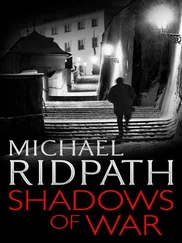Which was lucky, because dredging his memory was exhausting. Things were coming back. He could visualize that big house in Deauville. And he could almost see Nathan and Alden. Stephen was taking shape. He could hear his voice. He saw a tall young man, grinning in a leather armchair. Oxford. That was his room at Oxford.
Stephen. There was something he had to tell Stephen. Or give Stephen. What the hell was it? It was something really important. It wasn’t that he had killed Sophie, but it was something like that. Another matter of life and death.
Of death.
He groaned out loud. What the hell was it?
Frustrated, angry with himself, he set off up the rough path through the woods back to Culzie.
Jerry put down his binoculars when he saw the old man turn off the lochside track before the boathouse and head off up into the woods. The silhouette was familiar — the lopsided gait, the slight stoop. He was a sprightly old guy, Jerry would have to give him that.
Only the roof of Culzie was visible from outside the woods, but Jerry had spotted the old man on the open hillside. He had found a good vantage point behind a boulder by the shore of the loch, from where he could track the old man’s movements. But now the old man was in the woods, he would be out of sight all the way back to Culzie.
Jerry stared at the woods, and the rooftop in their midst. What the hell should he do?
Jerry, too, had had a bad night. His initial relief that the old man couldn’t remember him at all had subsided. The old man’s memory might return. From what the girl had said, the doctors expected at least some of it to come back over time. But how much? And over what period?
There was a library in Dingwall, there must be some books in there about amnesia. Maybe even access to the Internet. He would check, but the most likely result was that he would remain uncertain, that recovery from head injuries was inherently unpredictable.
There seemed to be two options. Wait and see how much the old man remembered, and just hope that he didn’t remember anything important. Or act now.
He had acted before, and it had nearly worked. He should have checked the body more carefully; he could have sworn that the old man wasn’t breathing as he lay on the floor at the foot of the stairs, blood dribbling out of the back of his head. Why hadn’t he banged the old man’s head into the floor a couple of times to finish him off as he had originally intended?
Because he didn’t want to leave any incriminating forensic evidence if he didn’t have to. But that part of the plan had worked perfectly. No one was in the slightest bit suspicious about an old man falling down the stairs and hitting his head. Why should a forensic scene-of-crime technician go anywhere near him?
Perhaps Jerry should try something more certain. There was an axe at Corravachie, which he used for splitting firewood. And the rifle locked in the gun cupboard.
No. Once the police suspected murder, a house-to-house inquiry around Loch Glass would turn up two houses and one suspect. Him. An accident was much better.
Jerry had an idea. He picked up the binoculars and examined the track near the boathouse.
It was a good idea.
Clémence heard the stairs creak as the old man descended them, followed by the slam of the front door. She turned off Zoë Ball — Radio 1 was the only half-decent station she could get — and extricated her hair from the straighteners. She went downstairs to the phone in the hallway. She hesitated before dialling; these international calls would blow a hole in the old man’s phone bill. So what? He deserved to pay. She dialled the Vietnam country code and the number in Ho Chi Minh City.
The school secretary took some persuading, but after a wait that seemed like half an hour but was probably only five minutes, she heard the familiar voice of her father.
‘What’s up, Clémence?’ He spoke in English. They used to speak to each other in French, but somehow they had switched to English after he had left Hong Kong. ‘Are you all right?’
He sounded worried. He sounded as if he cared. That was nice.
‘I’m OK, Dad. But I’ve got a couple of questions to ask you.’
‘Is it urgent?’ His voice was sterner now. ‘You told the secretary it was urgent.’
‘It is. It is. I’m at Culzie cottage on the Wyvis estate. With Alastair. Alastair Cunningham.’
‘What! What the hell are you doing there?’
‘He fell down the stairs and had an accident. He has lost his memory: retrograde amnesia, they call it. He doesn’t have any relatives. Aunt Madeleine asked me to come and look after him until she can get here from America.’
‘Why didn’t you check with me first, Clémence?’
‘Because we never speak to each other.’ It was true. They had only spoken twice in the last six months: once in September when she had returned from her disastrous stay with him in Vietnam, and then again when she had looked for sympathy after telling him about Patrick, and had received contempt. He never called her, and whenever she had called him over the last couple of years, he didn’t seem at all interested in talking to her. And it cost a fortune. So she had stopped.
‘There is a good reason why that man has no friends in England,’ her father said. ‘I want you to leave there right away. I want you to have nothing to do with the old bastard. Aunt Madeleine should never have sent you.’
‘All right, Dad,’ said Clémence. ‘She’s coming this afternoon, so I can hand over to her then. But I’ve still got a couple of questions to ask you. And they are important.’
Her father sighed. ‘All right. What are they?’
Clémence swallowed, listening to the long-distance hiss in the pause. She suspected her father wasn’t going to like her questions, but she had to ask them.
‘We are reading this book together, to help Alastair remember. It’s called Death At Wyvis by Angus Culzie. Do you know it?’
‘Yes, I know it.’
‘Was it written by Alastair? And is it true?’
‘How far have you got?’
‘They’ve just gone to Capri. Angus has had an argument with Sophie.’
‘Well don’t read any more, Clémence. Just leave Wyvis right away. There are things in that book that you are better off not knowing.’
‘No!’ said Clémence. She didn’t often defy her father, but she was angry. ‘No, Dad. That’s exactly what Grandpa said when I asked him about it—’
‘You spoke to Grandpa ?’
‘Yes,’ said Clémence.
‘Jesus. You shouldn’t have done that.’
‘Well, I did. And he didn’t answer my question. It’s all true, isn’t it? It must be true or else you wouldn’t be so worried about me reading it.’
There was silence, or a hiss, for several seconds.
‘Yes. It is true.’
‘Why didn’t you tell me, Dad? Why didn’t you tell me that my grandmother was murdered?’
‘Because I didn’t want to think about it. I didn’t want you to think about it. You didn’t even know her. She was my mother, remember. After she was killed I ran away to Morocco. I have spent a lot of time and effort making sure that you aren’t troubled by that mess. So please do as I ask, Clémence. Promise me you won’t read any more of that fucking book.’
Clémence never said no to her father. But what he had said made it even clearer than it had been before, that the key to understanding her screwed-up family lay in the pages of that book. And if she didn’t understand her family, she didn’t understand herself.
‘No, Dad. I don’t care what you say, I’m going to read the rest of it. I need to know.’
‘Clémence—’
But she hung up.
She felt a mixture of anger and guilt. Clémence had mostly been an obedient child, but she was older now and could make her own decisions. It was OK for her father to warn her that she might not want to learn what had happened at Wyvis to her grandmother. But it was her decision; he had no right to stop her.
Читать дальше












